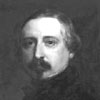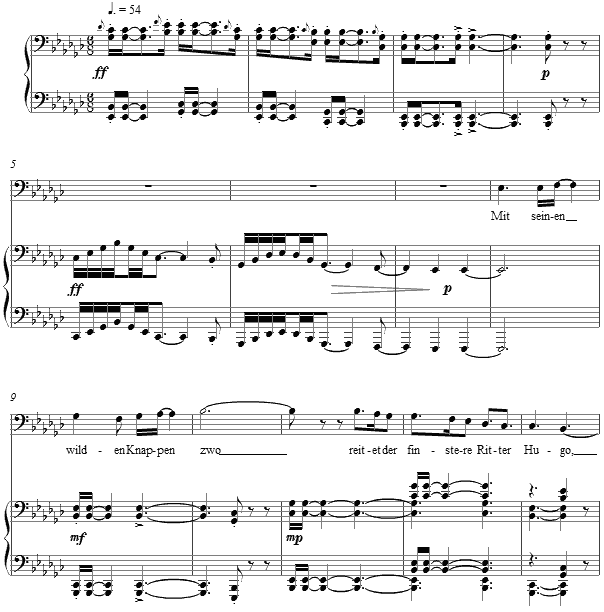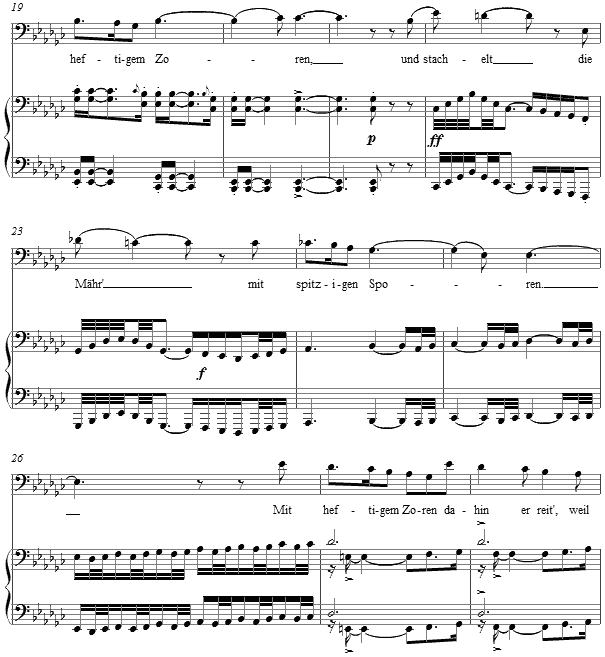Music and Texts of GARY BACHLUND
Vocal Music | Piano | Organ | Chamber Music | Orchestral | Articles and Commentary | Poems and Stories | Miscellany | FAQs
Hugo der Finstere - (2009)
Ludwig Kalisch
for baritone and piano
Mit seinen wilden Knappen zwo
Reitet der finstere Ritter Hugo,
er reitet dahin in heftigem Zoren
und stachelt die Mähr' mit spitzigen Sporen.
In heftigem Zoren dahin er reit',
weil ihn betrogen die schändliche Maid,
die ihre Ehre gar sehr verloren -
drum reitet er hin in heftigem Zoren.
Mit seinem langen, großmächtigen Speer
Ersticht er der Maid ihren Liebhaber,
ersticht er die Maid, die ihre Ehr verloren,
ersticht er sich selbst in heftigem Zoren.
Also verstarben diese drei -
Da waren noch der Knappen zwei.
Und da sie sonst nichts mehr hier verloren,
erstachen sie sich ganz ohne Zoren.[ 5 pages, circa 3' 05" ]
Ludwig Kalisch
On his mother's side, the German author and poet Ludwig Kalisch is of Polish background. In 1826 twelve-year old Kalisch left Lissa (today Leszno in Poland) and studied for three years in Glogau. For some time he traveled in Germany and thereafter in France, returning to Heidelberg to graduate in medicine in 1835 in Heidelberg; he then went on to study in Munich. In 1838 he spent time in Bingen, and two years thereafter in Mainz worked as an instructor for English und Italian. In 1847 he earned his Dr. phil. at the University in Giessen. He was publisher as well as a writer for the Karneval newspaper Narhalla, among its editorials he wrote an expose titled "Feudalism and Censorship." In the German Revolution he founded the Zeitung Der Demokrat. In mid 1849 Kalisch worked for the provisional government of the Pfalz. A participant in the revolution of 1848-49, he was forced to leave Germany, being convicted in absentia in the court at Zweibrücken. He went to Paris, in 1850 to London, working for a time as tutor for the House of Rothschild, and from 1851 onward lived in Paris until his death in 1882. He wrote extensively on bettering relations between Jews and non-Jews. Kalisch's forte was the humorous ballad. Many of his writings appeared in the feuilletons of the newspapers and in magazines, among his work: Das Buch der Narrheit (Mainz, 1845) Heitere Stunden (Berlin, 1872), Paris und London (1851), Pariser Leben (1880).
With his two rugged squires
rides the dark knight, Hugo,
who rides forth in violent wrath,
and pricks the mares with sharp spurs.
With violent wrath forth he rides,
because he was betrayed by a shameless maiden,
who quite fully lost her honor, --
And for this he rides forth in violent wrath.
With his long and frightful spear
he did in the maiden's lover,
and he did in the maiden, she who lost her honor,
and he did himself in too in violent wrath.
And so did these three die. --
And so there were left the two squires --
and there in order to be consistent with the story
they did themselves in without any wrath.
This "humorous ballad" suggested to me a melodramatic setting, less obviously comic as overly serious to the point of being comic. The first many measures consist of the same chord in many inversions throughout until the forceful gesture in octaves breaks this altered tonic of E flat minor.
The chromatic addition of sequential phrases against the underlying tonal region brings an air of violence as the text speaks of his pursuing the Moravians.
The ending is comic in a tragic way within this violent tale, as the two remaining characters in a plot of five kill themselves, simply to be consistent.
The score for Hugo der Finstere is available as a free PDF download, though any major commercial performance or recording of the work is prohibited without prior arrangement with the composer. Click on the graphic below for this piano-vocal score.


